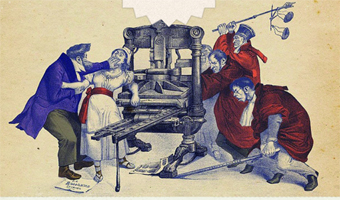The George Washington Forum on American Ideas, Politics and Institutions hosts an international conference on Freedom of Speech, 1550–1850 on Friday–Saturday, April 7–8.
 The conference brings together leading scholars of politics, religion and ideas to discuss the early history of free speech. The conference will be held in the Multicultural Center (Baker Center 205). The event is open to the public and all are welcome to attend.
The conference brings together leading scholars of politics, religion and ideas to discuss the early history of free speech. The conference will be held in the Multicultural Center (Baker Center 205). The event is open to the public and all are welcome to attend.
Friday, April 7
Session I (9–10:30 a.m.)
- Debora Shuger (UCLA), Déjà vu All Over Again: The Price of Fake News in Early Modern England
- Peter Lake (Vanderbilt), Libel and the Politics of Publicity
Session II (10:45 a.m.–12:15 p.m)
- Karl Gunther (University of Miami), Pearls before Swine
- Chloé Bakalar (Princeton), Everyday Virtue: The Role of Censorship in John Milton’s Theory of Free Speech
Session III (2–3:30 p.m.)
- David Como (Stanford)., The Origins of the Concept of Freedom of the Press
- Max Skjönsberg (London School of Economics), David Hume’s ‘Of the Liberty of the Press’ in its Original Context
Session IV (3:45–5:15 p.m.)
- Ann Thomson (European University Institute), Defending the Truth
- Anton Matytsin (Kenyon), To Ban or Not to Ban: Censorship, Refutation and Free Expression in the French Enlightenment
Saturday, April 8
Session V (9:30–10:30 a.m.)
- David Womersley (Oxford), The Resistance to Free Speech in Swift and Johnson
Session VI (10:45 a.m.–12:15 p.m.)
- Drew Starling (Penn), Malesherbes and the Case for a Free Religious Press in Eighteenth-Century France
- Tim Lehmann (Ohio), Montesquieu and Rousseau’s Accounts of Free Speech
Session VII (2–3:30 p.m.)
- Patrick Peel (Montana), The Argument for Freedom of Speech and Press During the Ratification of the US Constitution, 1787–1788
- Glauco Schettini (Fordham), In Search of a New Order: Freedom of Speech, Revolutionary Rhetoric and Republican Government in Italy, 1796–1799
Session VII (3:45–5:15 p.m.)
- Greg Conti (Cambridge), Liberty between the Mills: Samuel Bailey on Liberty of Thought and Discussion
- Chris Barker (Southwestern), J.S. Mill’s Theory of Public Engagement



















Comments